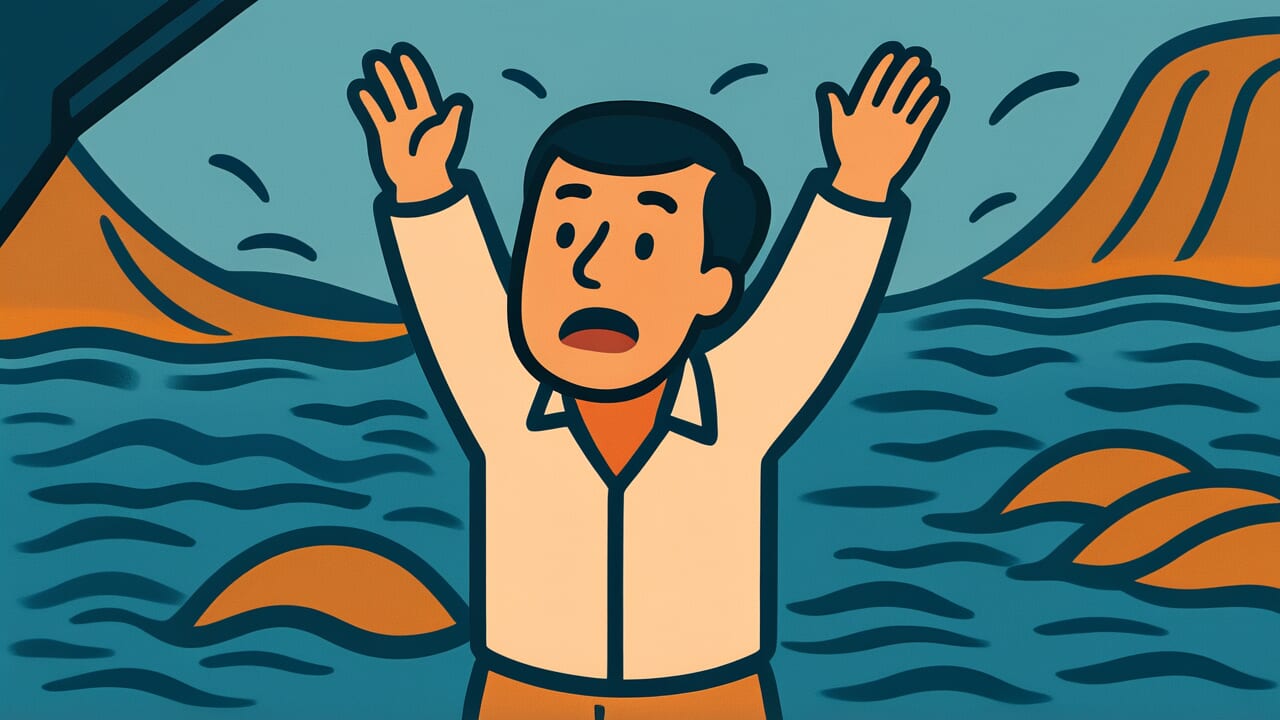How to Read “Those who sink into pleasure will capsize in sorrow”
Tanoshimi ni shizumu mono wa urei ni kaeru
Meaning of “Those who sink into pleasure will capsize in sorrow”
This proverb warns that people who drown in pleasure will eventually return to suffering. When you become too absorbed in immediate pleasures and lose self-control, hardship and difficulty will inevitably follow as a consequence.
People use this saying to caution someone who is too absorbed in entertainment, wasting money, or getting carried away by temporary success. The message warns: “You might be having fun now, but there will always be a price to pay later.”
The meaning of this proverb remains relevant today. Getting addicted to gambling, partying all night while neglecting school or work, or going into debt for luxuries are exactly the behaviors this proverb warns against.
After temporary pleasure, the harsh wall of reality always waits. This proverb teaches us a fundamental truth about life.
Origin and Etymology
The exact source of this proverb is unclear. However, its structure suggests it comes from Buddhist and Confucian teachings. The word “sink” describes a state of drowning deeply like in water. The word “capsize” means to return to the original place.
What’s interesting is that this saying doesn’t just offer moral advice. It shows the cycle of life. Drowning in pleasure and returning to sorrow move back and forth like a pendulum.
In Japan since ancient times, people believed that everything has a reaction. This proverb shares the same worldview as sayings like “the prosperous must decline” and “rise and fall.”
The word “sink” deserves attention. Instead of “taste” or “enjoy” pleasure, the proverb deliberately uses the negative word “sink.” This strengthens the warning against excessive pleasure.
Just as you cannot breathe when you sink in water, you cannot make sound judgments when you drown in pleasure. This metaphor is embedded in the expression.
Similar expressions appear in Edo period moral instruction books. This suggests the proverb was a life lesson widely shared among common people.
Usage Examples
- He spent all his money at drinking parties every night. Now he struggles to repay his debts. Those who sink into pleasure will capsize in sorrow, indeed.
- This is what happens when you only play games and don’t study. Those who sink into pleasure will capsize in sorrow is so true.
Universal Wisdom
This proverb speaks to the eternal battle between human desire and reason. We all have moments when immediate pleasures capture our hearts. This is a natural human emotion and not necessarily bad.
However, our ancestors discovered one law through long history. Pleasure that loses balance always creates a backlash.
Why was this proverb created and passed down through generations? Because countless people have repeated the same mistake. Drowning in temporary pleasure, then feeling regret. This repetition has been human history itself.
Stories of successful people who became arrogant and fell, tales of wealthy people who drowned in luxury and faced ruin—these have been told worldwide across all times and places.
What’s interesting is that this proverb doesn’t recommend simple abstinence. It doesn’t deny pleasure itself. It warns against drowning so deeply that you “sink.”
In other words, it teaches that humans need self-control as a rudder.
Humans are creatures who seek pleasure. But at the same time, we can imagine the future and predict consequences. The balance between these two qualities is the key to living a fulfilling life.
This is what the proverb teaches us.
When AI Hears This
In the brain’s reward system, a substance called dopamine is released when you feel pleasure. Interestingly, the brain judges this state as an “emergency situation.” Why? Because the brain’s top priority is maintaining a stable state, or homeostasis.
When you continue immersing yourself in pleasure, the brain automatically begins a defense response. Specifically, it reduces the number of dopamine receptors or lowers their sensitivity. This is called downregulation.
For example, if you eat cake every day, the initial excitement fades. This is exactly this phenomenon. Research shows that when the reward system is repeatedly stimulated, receptors can decrease by up to 40 percent within weeks.
What’s frightening is this: in a brain with reduced receptors, ordinary daily life that once made you happy enough now feels unsatisfying. In other words, the baseline for pleasure rises.
A peaceful state with nothing special becomes relatively recognized as “depression.” Put differently, pursuing too much pleasure dulls the brain’s sensitivity itself. Former happiness flips into unhappiness.
This is exactly the mechanism of “Those who sink into pleasure will capsize in sorrow” proven by neuroscience.
Lessons for Today
What this proverb teaches modern you is that life has a “just right amount.” Scrolling through social media endlessly, watching videos for hours, spending too much money shopping. Modern society overflows with temptations that make us “sink.”
In an era when you can access infinite pleasure with just a smartphone, this old proverb’s value has actually increased.
The important thing is not to deny pleasure. It’s to draw a boundary line within yourself between enjoying and drowning. Will today’s pleasure drag down tomorrow’s self? Just having the habit of asking this question can greatly change your life.
Specifically, before enjoying something, imagine: “How will I feel after doing this?” If you know you’ll regret it, that’s drowning-level enjoyment.
But if you can still smile tomorrow, that’s healthy enjoyment.
You have the power to hold the rudder of your own life. Don’t just drift along—make your own choices. This proverb is an invitation to that kind of proactive way of living.



Comments